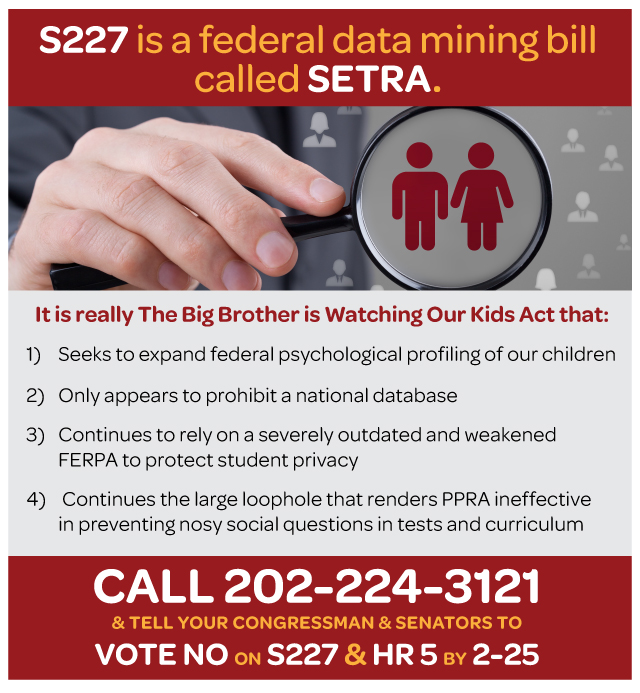S227 (SETRA) is a Federal Data Mining Bill that Destroys Student Privacy
Karen R. Effrem, MD – President
Besides urging a no vote on HR 5, the Student Success Act that replaces No Child Left Behind, please contact your US representatives and Senators to vote NO on S 227, the Senate version of the federal data mining bill. Having already passed the Senate last year and about to be passed again, it was scheduled for a vote today, Wednesday February 25th in the US House. That vote was contingent on easy passage in the Senate. Thankfully, however, as more information comes out about this bill, it is no longer seen as non-controversial, and easy passage is no longer assured in either chamber. It has been removed from the House calendar pending Senate approval, but thanks to the work of Education Liberty Watch, The Florida Stop Common Core Coalition, American Principles in Action, Eagle Forum and others, Senators are objecting.
S 227, the Strengthening Education through Research Act (SETRA) reauthorizes the 2002 Education Sciences Reform Act (ESRA) that has been very problematic, because it started the concept of state longitudinal databases, stepped around the prohibition on a national database by creating “national cooperative education statistics systems,” allowed personally identifiable information to go to international agencies, and removed the previous penalties of fines and imprisonment for misusing individual student data. SETRA continues or worsens all of that. Here are four major problems with SETRA (A detailed analysis of these points is available HERE):
3 Comments
Issues
- Assessments + Testing (25)
- Bullying/Sex Education (6)
- Child Protection League (2)
- Common Core Standards (78)
- Curriculum + Standards (65)
- Data Collection and Data Privacy (64)
- Early Education/Nanny State (75)
- Federal Education (128)
- International Education (6)
- LGBT Issues in Education (9)
- Media Appearances (4)
- PL/CBE (2)
- Planned Economy (11)
- Politics of Education (26)
- School Violence (9)
- Social Emotional Learning/Mental Health (52)
- State Education (89)
- Testimony/Presentations (17)
- Uncategorized (13)
- Unions (10)
Education Liberty Watch Projects
ELW Allies
- American Principles Project
- Cato Institute
- Conservative Teachers of America
- Constitutional Coalition
- Eagle Forum
- Minnesota Advocates and Champions for Children
- Missouri Education Watchdog
- Restore Oklahoma Parent Empowerment
- Stop Common Core
- The Pioneer Institute
- Truth in American Education
- What is Common Core – Education Without Representation





[…] http://edlibertywatch.org/2015/02/s227-setra-is-a-federal-data-mining-bill-that-destroys-student-pri… and […]
[…] http://edlibertywatch.org/2015/02/s227-setra-is-a-federal-data-mining-bill-that-destroys-student-pri… and […]
[…] the weary. Congress continues to erode student privacy along with parental autonomy. In February, we warned of the bill to reauthorize the National Center for Education Statistics and the National Assessment of […]